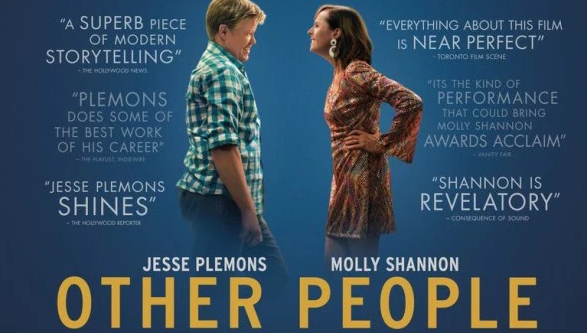No one can fully understand Sacramento unless they’re from there. Unlike New York or L.A., it is not the sort of place that can become your “adopted city.” Like talent or money, Sacramento is inherited as a result of your ancestors. This is why only Chris Kelly, born and raised in California’s capital could tell the story of Other People. A somewhat under the radar film from the beginning of 2016, Kelly is no stranger to the limelight (at least by writer standards). As a former staff writer for both Funny or Die and Onion News Network, Kelly is now slated to become the head writer for SNL and consults regularly on Broad City. But Other People serves as his first feature, and includes the sort of care and attention to detail one would expect of a story so personal.
Kelly’s largely autobiographical tale centers on David Mulcahey (Jesse Plemons), an aspiring comedy writer living in New York City who must return home to Sacramento to help care for his cancer-ridden mother, Joanne (Molly Shannon). Incidentally, Kelly’s own mother was named Joanne, and died of cancer in 2009. Accordingly, Kelly chooses to begin the film with Joanne’s death so as to get the message across that this isn’t a film about “the mother” or “will she die or won’t she die?” so much as a movie about the drastic differences between what a place like New York represents versus a place like Sacramento.
Via exterior shots of all the local staples, including California Backyard, Applebees and presumably a Safeway or Raley’s (grocery shopping is quite the event in Sacramento, one used to fill the time more than adhere to a healthy, affordable diet), Sacramento is a beige character in and of itself. And when contrasted against New York, it paints a stark portrait, though it does help his family to understand why he’s there as they watch him perform improv on the Upright Citizens Brigade stage. Nonetheless, David’s father, Norman (Bradley Whitford, who will forever be the asshole from Adventures in Babysitting), refuses to acknowledge that his son is gay, thereby declining an invitation up to his semi-boyfriend’s apartment while the rest of his family partakes.
Back in Sacramento, where Joanne has continued to agree to pay for David’s rent in exchange for his brief hiatus from creative productivity, David reconnects with an old high school friend and fellow gay, Gabe (John Early of Search Party). As his sole lifeline to any sort of contact that fully grasps how stagnant it feels to be back in this town, Gabe assures David, “I’m gonna take you to the gayest bar I can think of in Sacramento,” That bar is an emptyish throwback to the 80s consisting of a vacant dance floor, a rotund man sitting at the bar and a paraplegic milling around in his wheelchair. But at least it’s a great place for David and Gabe to catch up and discuss the former’s many life woes, including, but not limited to, his inability to sell a pilot script he was banking on getting picked up, the recent breakup with his boyfriend, Paul (Zach Woods), and, oh yeah, his mother’s imminent death.
Gabe insists that David try the dating scene while he’s in the area. Sure it’s bleak, but at least it’s somewhat of a distraction. David finally caves, joining OKCupid and meeting up with a guy who assumed that because he said drinks at 9, David understood this meant no dinner. After all, it’s Sacramento. People eat early. And drink almost equally early.
Assuming he can at least commiserate with his date about hating Sacramento, David is horrified and perplexed to hear him say instead, “I kind of like Sacramento.” The only thing more troubling than this statement is his follow-up: “I rented Mirror Mirror from the grocery store. It was all they had.”
Kelly’s nuanced depiction also perhaps subtly extends to nodding to one of the few people ever spawned from this place to make it out. Specifically, the presence of Paul Dooley as Joanne’s father, Ronnie, serves to remind one of Sacramento’s own Molly Ringwald, back when she played his daughter, Samantha, in Sixteen Candles. The ennui that breeds frustration for an un-pinpointable reason in Sacramento (except, in David’s case, his mother’s health is a large factor) reaches its fever pitch as David searches for laxatives in the grocery store for Joanne. Unable to find them in his drunken and frantic state, David finally plops to the ground with two packages of toilet paper beneath his arms. When a grocery employee asks him if he’s okay, he explains he just needs the laxatives. “They’re right here, in front of you,” she returns. The statement is very obviously loaded, as in David’s case, what’s right in front of him is his family, who he’s neglected often in favor of pursuing a lifestyle and career choice that simply cannot exist in his hometown. But when a person returns to his family in Sacramento, there can’t help but be a tinge of bittersweetness. You want to relate, yet the longer you’re gone, the more difficult it becomes–asking yourself how you ever endured here in the first place. Possibly the only other film to have briefly touched on this Sacramento-specific phenomenon is Frances Ha, in which the eponymous character (played by Greta Gerwig, another Sacto escapee) returns home for the holidays and mainly hangs out in relatives’ houses. Because that’s just what you do there. It’s a family-heavy place.
Most salient of all, however, is one of Kelly’s soundtrack selections. The running joke throughout the film is the constant playing of Train’s “Drops of Jupiter” from 2001, a song no one should be surprised to hear on this city’s airwaves as it’s perpetually about ten years behind everywhere else. Like Sacramento itself, the song is forgettable, only reminding you of how bad it is when you revisit it, even though you were at first willing to give it another chance.






















